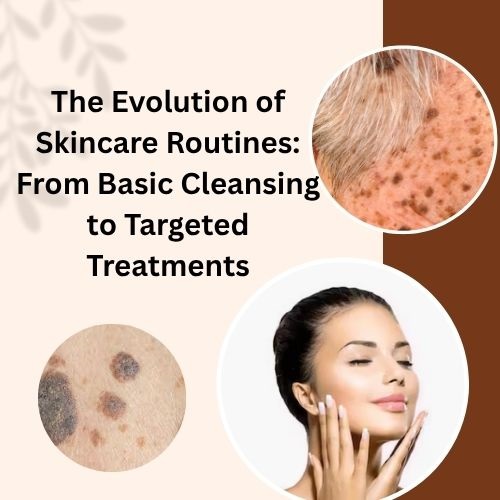The Evolution of Skincare Routines: From Basic Cleansing to Targeted Treatments
Skincare has changed significantly over the past few decades. What once revolved around a simple routine of cleansing and moisturising has grown into a more personalised approach involving targeted treatments, ingredient-conscious choices, and a better understanding of how skin behaves over time. If you're trying to manage specific concerns like acne, pigmentation, or seborrheic keratosis, your skincare choices today are far more nuanced than they were even a decade ago.

The Early Days: Soap and Water
In the past, skincare often meant little more than washing your face with bar soap and applying a basic cream, if anything at all. For many, especially older generations, skincare was viewed as a functional practice – simply keeping the skin clean. There was limited awareness of skin types or conditions, and even less access to specialised products. The concept of using separate products for oily or dry skin was virtually unheard of.
The Rise of the Multi-Step Routine
By the 1990s and early 2000s, the idea of a structured skincare routine gained popularity. Cleansing was still the foundation, but exfoliation, toning, and moisturising became standard steps. Brands began marketing products for specific concerns, and consumers became more aware of terms like "anti-ageing," "hydrating," and "non-comedogenic."
This period also marked the beginning of ingredient awareness. People started paying attention to elements like salicylic acid, retinol, and vitamin C, seeking targeted results rather than general improvement.
Skincare as Self-Care
In today's fast-paced world, self-care has become more important than ever. While self-care can take many forms—like meditation, exercise, or journaling—one deeply nurturing practice often overlooked is skincare. More than just a beauty routine, skincare can be a powerful ritual of self-love and mindfulness.
The Connection Between Skincare and Self-Care
Skincare isn't just about clear skin; it's about taking time for yourself. When you slow down to cleanse your face, apply a mask, or gently massage in a moisturizer, you're not just treating your skin—you're sending yourself a message: "I am worth this care and attention."
This ritual, even if it's just 10 minutes a day, can become a grounding habit. It gives you time to pause, breathe, and focus on the present moment. For many, skincare routines provide comfort, routine, and stability in a busy life.
Benefits of Skincare as Self-Care
1. Boosts Mental Well-Being
Doing something kind for yourself can lift your mood and reduce anxiety. The act of caring for your skin can feel like a small victory in your day.
2. Encourages Mindfulness
When you focus on how your skin feels or how a product smells, you're practicing mindfulness—being present in the moment without judgment.
3. Improves Self-Confidence
Healthy, glowing skin can improve self-esteem. But more importantly, knowing you're taking care of yourself fosters inner confidence.
4. Creates a Personal Ritual
Having a morning or nighttime skincare routine gives you something to look forward to. It's a peaceful moment of "me-time."
Tips for Creating a Self-Care Skincare Routine
- Keep it simple. You don't need 10 products. Start with the basics: cleanse, tone, moisturize, and protect (with SPF).
- Make it enjoyable. Use products with scents or textures you love. Play soothing music or light a candle to enhance the atmosphere.
- Listen to your skin. Skincare is not one-size-fits-all. Notice how your skin responds and adjust your routine accordingly.
- Be consistent. Like any form of self-care, the key is consistency. A few minutes each day can lead to lasting results—both physically and emotionally.
The Age of Targeted Treatments
Today, skincare routines often include products that address very specific concerns: hyperpigmentation, rosacea, hormonal acne, or conditions like seborrheic keratosis (SK). Treatments can range from prescription-strength topicals to in-office procedures like cryotherapy or laser removal.
People are also turning to dermatologists and specialists earlier, recognising the value of medical input alongside cosmetic care. This growing interest in medically informed skincare means more individuals are investing time in learning about their skin's needs and how best to support it.
Supplements and Skincare: A New Layer
As interest in holistic wellness increases, some are exploring the connection between internal health and skin appearance. This includes general wellness supplements – like collagen, omega-3s, or probiotics – being included as part of skincare regimens.
In this broader trend, there's been curiosity around internal treatments for visible skin conditions. For example, some individuals have looked into using a Herbal Supplement for Seborrheic Keratosis in the hope of managing the condition from within. However, while natural supplements can support overall health, they are not a primary or clinically backed treatment for SK. Effective treatment typically involves topical therapies or procedures under medical guidance.
Looking Ahead
Skincare routines will likely continue to evolve as science advances and consumer awareness grows. With more access to research, better product formulations, and personalised advice, the modern skincare routine is becoming increasingly intentional and evidence-informed.
Yet, one truth remains: consistency and simplicity still matter. No matter how advanced your routine becomes, understanding your skin's unique needs and addressing them gently and effectively is what leads to lasting results.
